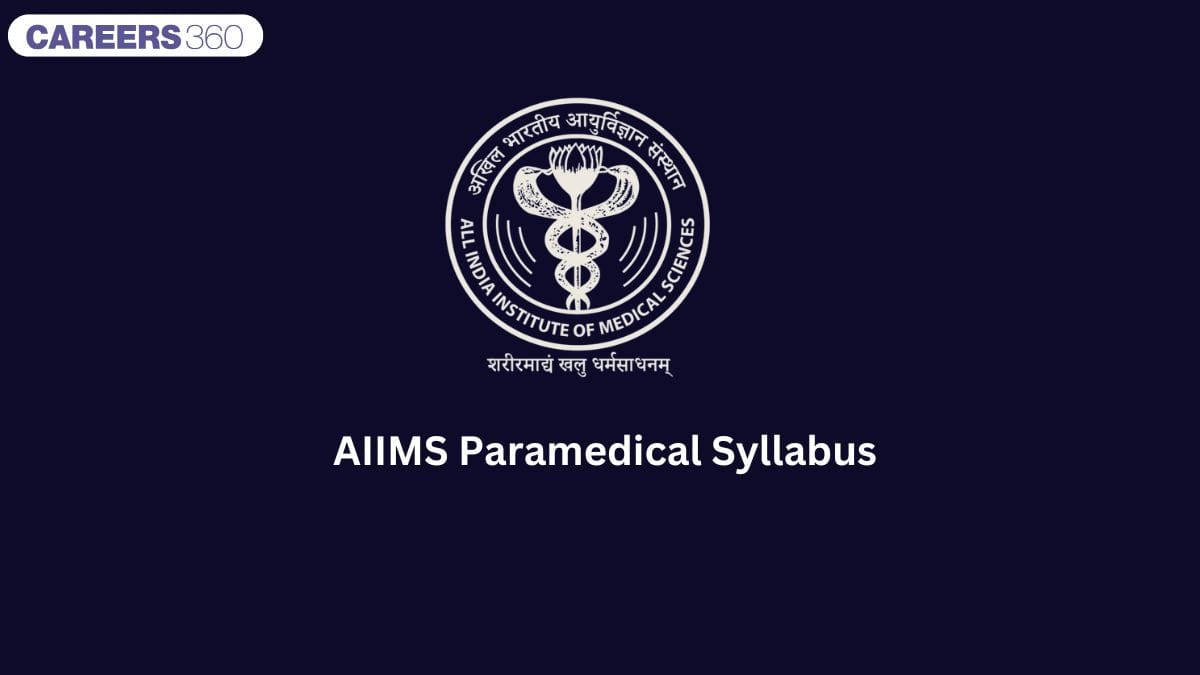Virohan Allied & Healthcare Programs
Allied & Healthcare programs | 20+ Partner Universities & Institutes | 98% placement record
The All India Institute of Medical Sciences (AIIMS) is the authority to set the paramedical syllabus. Aspirants preparing for the AIIMS Paramedical exam must know the AIIMS Paramedical syllabus 2026 thoroughly for better exam preparation. The AIIMS paramedical syllabus 2026 is set for medical technology in radiography, Bachelor of Optometry and various paramedical courses.
This Story also Contains

The AIIMS paramedical exam syllabus is based on the class 12th level. The AIIMS Paramedical 2026 syllabus intends to help the students understand the topics studied in their higher secondary classes. Read the article on the AIIMS Paramedical syllabus 2026 to get a thorough idea of the topics asked in the AIIMS Paramedical exam and other details here.
As per the official information brochure, the authority did not provide any defined AIIMS paramedical syllabus 2026 for the medical entrance exam and has only specified that “The general standard of each entrance examination will be that of class 12 under the 10+2 scheme or an equivalent examination of an Indian university/board. The authority has not provided any official AIIMS paramedical exam syllabus.
Allied & Healthcare programs | 20+ Partner Universities & Institutes | 98% placement record
As mentioned above, the authority doesn’t provide the AIIMS paramedical syllabus pdf download on the website. However, the tentative AIIMS paramedical entrance exam syllabus is based on classes 12 is mentioned below. This syllabus of AIIMS paramedical provided below covers all the major topics from which there is a high possibility of questions being asked.
AIIMS Paramedical Syllabus 2026 for Physics
AIIMS Paramedical Syllabus 2026 for Chemistry
AIIMS Paramedical 2026 syllabus for Biology
Along with the syllabus of AIIMS Paramedical, candidates must check the exam pattern to understand the exam duration, number of questions asked in the AIIMS paramedical exam, mode of exam, and other important information. Check the AIIMS Paramedical exam pattern in the table below.
AIIMS paramedical 2026 pattern
Particulars | Details |
Duration | 1 hour 30 minutes |
Mode | Offline |
Number of questions | 90 |
Type of questions | MCQs |
Marks | 90 |
Understand the AIIMS paramedical 2026 syllabus - It is important to have a good understanding of the AIIMS paramedical exam syllabus before appearing for any entrance examination. The candidate should know the basic concepts of the subjects.
Learn basic concepts before the complex ones - It is important to get the basics clear before going after the complex topics. NCERT books are considered best for building a strong foundation of basic concepts.
Be consistent - Rather than trying to cover the whole syllabus in a short period, it is important to be consistent and study regularly.
Use a combination of study material and resources - It is advised to use a combination of both study material and resources. Along with the study material, the candidates should also attempt mock tests to get an idea of the level of questions asked.
Analyse and work on your weaknesses - It is important to note down your weaknesses after attempting mock tests. Analyse the pattern and type of questions you are failing to solve and learn the basic concepts of those particular topics. Remember that without a solid foundation, you will fail to create something of value.
Make your notes - The candidates are advised to prepare their notes after studying a particular topic. The candidates can also prepare their short tricks to remember a particular topic.
Do proper Revision - Revision is equally important alongside studying. It is important to revise the topics candidates have already studied. A consistent study pattern with regular revision can boost the chances of excelling in the AIIMS paramedical entrance exam 2026.
Frequently Asked Questions (FAQs)
Yes, the aspirants need to revise all the topics of class 11th and 12th to ensure a good rank in the medical entrance exam.
AIIMS releases the entrance exam pattern on its official website in the information brochure.
There are four sections in the AIIMS paramedical exam 2026 i.e. physics, chemistry, biology and mathematics. However students only have to attempt three out of four sections i.e. anyone between biology or mathematics.
Allied & Healthcare programs | 20+ Partner Universities & Institutes | 98% placement record
Amongst top 3% universities globally (QS Rankings) | Wide Range of scholarships available
Ranked #19 by NIRF, NAAC A++ Accredited | Recognized by dental council of India
Ranked #18 by NIRF, NAAC A++ Accredited | Unmatched clinical exposure with over 7 lakh patients yearly